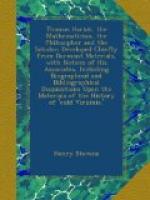A most studious investigator of truth, A most pious
worshipper of the Triune God,
At the age of sixty, or thereabouts,
He bade farewell to mortality, not to life,
July 2d A.D. 1621.
He lived, died, and was forgotten in the parish of St Christopher. Henceforward, whenever Englishmen and Americans, merchants and scholars, rich and poor, men of genius and men of money, enter this little’ Garden,’ let them read there in English what Henry Percy originally set up in Latin, the above inscription.
An impression has gone abroad, traceable chiefly to Aubrey and to Anthony à Wood, that Hariot was unsound in religious principles and matters of belief; that he was, in fact, not only a Deist himself, but that he exerted a baleful influence over Raleigh and his History as well as over the Earl of Northumberland. Not to misstate this utterly unfounded imputation, the very words of Wood, as first printed in his Athenæ in 1691, and never since modified, are here given in full: ’ But notwithstanding his great skill in mathematics, he had strange thoughts of the scripture, and always undervalued the old story of the creation of the world, and could never believe that trite position, Ex nihilo nihil fit. He made a Philosophical Theology, wherein he cast off the OLD TESTAMENT, so that consequently the New would have no foundation. He wasaDeist, and his doctrine he did impart to the said Count [the Earl] and to Sir Walt. Raleigh when he was compiling the History of the World, and would controvert the matter with eminent divines of those times; who therefore having no good opinion of him, did look on the manner of his death as a judgment upon him for those matters, and for nullifying the scripture.’
It is needless to say that in all our investigations into the life, actions, and character of this eminent philosopher and Christian, from the time when, as a young man in 1585, he took delight in reading the Bible to the Indians of Virginia, down to the time that he made his remarkable will in 1621, not one word has been found in cor-roboration of these statements; but, on the contrary, many passages have appeared to contradict and disprove them. Let any one notice the numerous citations of the various books of the Bible in Raleigh’s History, and he will surely fail to discover any evidence of Raleigh’s being a Deist, or that Hariot had taught him to undervalue the scripture.
It is not necessary here to say more in this connection than to quote the following passage from one of the Latin letters in 1616 referred to above by Hariot to the eminent physician who had just received a high medical appointment at Court, describing himself and his terrible affliction [a cancer on the lip]. The passage is given in English, but the original Latin may be seen in the British Museum (Add. 6789). It seems to have been written on purpose to refute such slanders. He writes :




